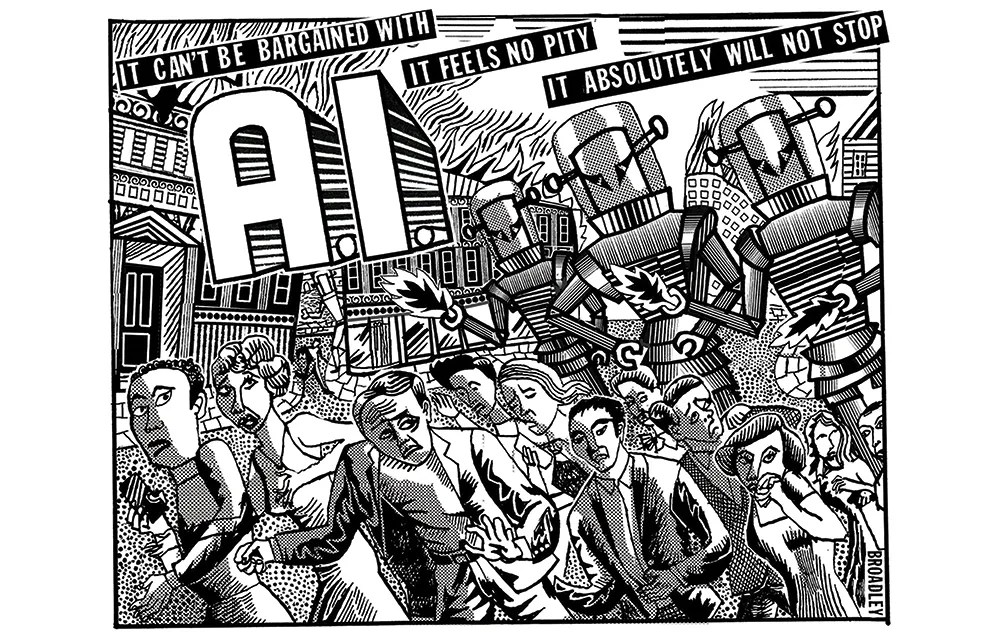Imagine if you somehow knew a war was coming in the next few years. Imagine if you knew this war would change societies, transform economies, and possibly even endanger humanity. Now imagine Britain held a general election, with that certain knowledge of imminent turmoil, and no one mentioned it, and instead the politicians waffled on about stealth taxes, low traffic neighbourhoods, and making energy drinks harder to obtain for children aged 15 and 3/4.
Not only is this raging silence insane, it is bizarrely, recklessly irresponsible
That would be mad, right? And yet that is what we are doing in Britain today, in regards to the looming revolution that is Artificial Intelligence. We are simply not talking about it. I haven’t heard a single politician mention it, reference it, discuss it, in any but the most glancing fashion (‘it might help productivity in the NHS’).
Not only is this raging silence insane, it is bizarrely, recklessly irresponsible. Because AI is going to massively impact all the things we do talk about.
Take education. Britain is rightly proud of its ‘world beating university sector’. Yet we are also concerned about the funding of these universities, and how they rely on foreign students, who bring dependants. And so we ask ourselves, should we cut back on foreign students, maybe we need to raise student fees, and so on. Whereas the question we need to be asking is: what happens if – when – the university sector collapses?
Because this is likely to happen. Experts reckon ‘multimodal AI at PhD level’ is just two or three years away. Put that in layman’s terms: an AI that can see and hear and talk – that can interact like a human – is coming soon. This AI will be more intelligent – at almost everything, from engineering to maths to medicine to saying things that actually make you laugh – than 98 per cent of humankind. Maybe 99.99 per cent.
When that happens – in a few years, possibly within Keir the Toolmaker’s first term – a university education will be rendered pointless. Everyone will have a personal AI which can do every cognitive task, superbly. Why spend three years at college learning something when you know your smartphone will do it miles better and vastly quicker? Does anyone spend three years learning to do sums really fast? No, because we have pocket calculators. Soon we will have pocket calculators for everything.
No one will want to go to uni and rack up loads of debt, when there likely won’t be nice jobs at the end of it. And even if teens are still keen on learning, AI will provide personal bespoke one-on-one tutoring better than any bored or weary academic, and do it for pennies, and do it at home.
In this light, it is probable we will soon kiss goodbye to our ‘world-beating university sector’. My guess is only a few elite unis will survive, as glorified finishing schools for the rich, allowing their kids to network. The vast majority of higher education will vanish.
Another thing politicians like to boast about is Britain’s ‘world beating creative sector’. This too is about to be decimated. Hollywood moguls are already predicting the end of the entire Hollywood ecosystem – the same will happen to Bollywood, and British TV. Even as I type this, a new video generating AI has just launched, called Luma. With Luma you can make your own five second movies. Try it. The tech is amusing but primitive – but remember that AI images went from photos of ten-fingered freaks to undetectable perfection in about 18 months.
You may say: well, that’s just a few actors and directors in the bin, we will largely survive, but that is not the case. The creative industries in the UK employ 2.4 million people. There is a good chance most of these roles will disappear in the coming years, and only live entertainment – real people singing, dancing, acting, in front of your human eyes, will survive. But they will likely be singing AI songs, and acting AI dramas. The writers are doomed, as well.
All this can be applied across every cognitive sector. If you are a coder, a solicitor, a manager, an accountant, a researcher, an editor, a banker, a designer, an architect, a copywriter, a publisher, a scientist, a salesperson, an engineer, a mathematician, a consultant, a therapist, an actuary, or a session violinist at Abbey Road Studios, your job is seriously imperilled.
The Chinese AI mogul Kai Fu Lee has predicted that ‘50 per cent of jobs will go in three years’. Even if he is out by a factor of ten that’s a million high-paying jobs in the UK. And he won’t be out by an order of magnitude forever.
However you frame it, this is a sobering if not terrifying prospect. We are, as I said, facing a world-changing event on a scale that matches global war, and what’s more we know this. Rishi Sunak actually held an AI summit at Bletchley to debate this. Yet he says nothing about it, like every other politician.
Perhaps another analogy will illustrate Britain’s idiocy. Our politicians are like monkeys sitting on a strangely waterless beach, squabbling over who gets the flapping fish, and how to divide the drying seaweed. Meanwhile the tsunami gathers on the horizon, ready to surge inland, and sweep us all away.







Comments